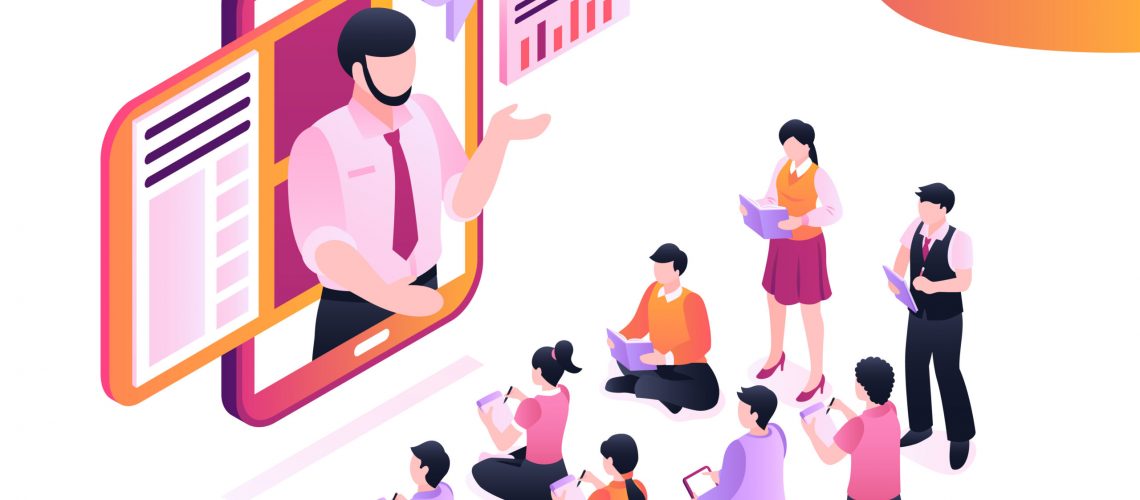Paradigm Shift in Online Education in the Lockdown Times :-
- Online lessons are helping educational institutions around India beat the Covid-19 lockdown to completed ahead of the actual academic calendar.
- Internet Ethics and digital wellness have raised concerns about the current trend and have expressed alarm about the potential dangers of internet exposure for young children at the risk of “online sexual exploitation and grooming”.
- While others say they are scared the digital shift may alienate economically disadvantaged students who don’t have access to the technology digital lessons required.
Indian Scenario of Online Education :-
- India’s online education market is set to grow to USD 1.96 billion and around 9.6 million users by 2021 compared to 2016 which was USD 247 million with 1.6 million users.
- The main components of online education would be (a) Re-skilling and online certifications (Skill enhancement certifications i.e. PMP, ITIL Etc) (b) Primary & secondary supplemental education (Supplement to school learning i.e. Byju’s App) (c) Test preparation (Competitive exams i.e. GRE, TOEFL Etc) (d) Higher Education (Distance Education Programs) (3) Language & Casual Learning (Non-academic subjects like English or Vedic Maths)
India’s online students:
- Perceive convenience, flexibility with commencement dates and variety of study material are key motivational factors to adopt online channel
- Cite peers and internet search as the top two sources of brand awareness
- Indicate quality of course content as the top reason for selecting a specific brand
- Prefer laptops over mobile phones for accessing the course content
Few Government Initiatives:-
- Best-in-Class Instructors. Empowering students and working class professional with knowledge and skills.
- an initiative by AICTE based on the PPP model to enhance the employability skill among students, in collaboration with Education Technology Companies
- e-PG Pathashala or e-content containing modules on social science, arts, fine arts, natural and mathematical science,
- CEC-UGC YouTube channel, Vidwan – A database of experts who provide information to peers and prospective collaborators,
- National Digital Library (NDL) – A repository of learning resources with single window facility. Many noteworthy initiatives have been taken up like Spoken Tutorial,
- FOSSEE – Free / Libre and Open Source Software for Education) project promotes the use of FLOSS tools in academia and research.
- e-Yantra Symposium(eYS) – Is an annual event at IIT-Bombay, to bring together colleges which have set up robotics labs through the e-Yantra Lab Setup Initiative (eLSI) and many other initiatives.
Few Other Initiatives:-
- MOOCs – Massive Open Online Course for non-technology courses aimed for teachers and up-skilling employees
- Google Classroom – Worked with educators across the country to create Classroom: a streamlined, easy-to-use tool that helps teachers manage courseware
Few Webinar Tools:-
- ezTalks Webinar – https://www.eztalks.com/
- Zoom – https://zoom.us/
- Zoho – https://www.zoho.com/meeting/
- GoToWebinar – https://www.gotomeeting.com/en-in/webinar
- Skype – https://www.skype.com/en/
- Click Meeting – https://clickmeeting.com/
- Livestorm – https://livestorm.co/
- Webinars On Air- https://www.webinarsonair.com/lp/powerful-webinar-software/
- Demio – https://demio.com/
- Ever Webinar – https://home.everwebinar.com/index?r_done=1
- Adobe Connect-https://www.adobe.com/products/adobeconnect/meetings.html
- Dacast – https://www.dacast.com/
- Big Marker Webinars – https://www.bigmarker.com/
- Webex – https://www.webex.co.in/
- Get Response – https://www.getresponse.com/
- Click Meeting – https://clickmeeting.com/
- Webinar Ninja – https://webinarninja.com/
- Easy Webinar – https://easywebinar.com/
- Google Meets – https://meet.google.com
- Live Stream – https://livestream.com/
- Any Meeting – https://www.anymeeting.com/signup/
Positive Side of Online Education:-
- Internet / Smartphone Penetration – Online education only requires a laptop or a smartphone with an internet connection, students can learn anywhere at any time.
- No Need to visit College: -This helps working professionals to pursue new courses during the week end without giving up their jobs.
- Affordable UG & PG Courses – Online education is much more cost effective than doing a regular on-campus degree without spending a fortune on college fees.
- Methodology – In the traditional education, everyone taught together and every one may not follow at the same level. The course materials are provided beforehand, students learn it by taking their own time and they can repeat the sessions any number of times.
- Time Saving: – Students can clarify their doubts by live chats or forums at their free time. Take Mock Tests and also enrol the online examinations at their free times.
- Acceptance: – Online degrees are accepted by many companies and employers in India as long as it is accredited and approved by Distance Education Council (DEC) of India.
- Anytime Examination – Students can take up online exams with the help of i.e. Prometric, Pearson VUE and EdCIL India testing centres, where they undergo a stringent procedure including the bio metric scan and the entire testing process is recorded on camera. i.e. GRE & TOEFL are held across the globe in such testing centres.
Negative Side of Online Education:-
- Distraction – Students can easily lose track of their studies in online education since there are no face-to-face lectures and classmates to remind you about assignments.
- Fake Online courses – There are many universities that offer online courses without the accreditation of any educational authority (Fake Universities)
- Practical’s – Cannot do Labs / Workshops required for many of the Technical Programs.
- Professional Networking – Also in courses like MBA you miss the chances of professional networking, overseas experience which is the key part of the programs.
- Discipline – The bottlenecks of online learning is the completion rate. What if student does not have discipline and cannot self-monitor then the course fails its purpose.
- Affordability – Many children from poor families studying in government and municipal schools are staring at disruptions in their studies without access to mobiles, internet and laptops or desktops, even as privileged students from private schools are taking online classes amid the coronavirus lockdown.



